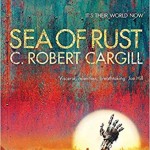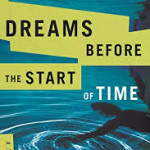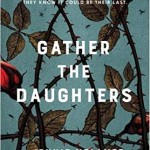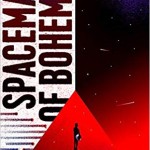At the Eleventh Hour: The Arthur C Clarke Award shortlist 2018
Better late than never! I have been overwhelmed with books to read this year, and it was seriously looking as though I'd not get the Clarke's shortlist in. The mid-range prognosis was helped by the fact that I've already read the nominees for the BFS Holdstock award (the one Tiger & Wolf picked up last year, ahem hem), so that buys precious time to read those books I've been sitting on for a while desperately wanting to read.
The Clarkes shortlist this year is pretty eclectic, from my very limited viewpoint, in that I'd literally read none of the above, and had only even been aware of 3 of the 6. The upside of which is, of course, that I've got to read several excellent books I would simply not have encountered otherwise. Such is one benefit of shortlists.
 Borne — Jeff Vandermeer, 4th Estate
Borne — Jeff Vandermeer, 4th Estate
Weirdly, I was just about to start in on Borne when the shortlist was announced, as it had been on my radar for a while. I'll be frank: I've been a fan of Vandermeer since long before I got into print myself. He's one of those writers I've admired for his weird fiction, for simply writing things that nobody else was every going to write, and in ways no other writer would dream of. This is even before his remarkable Southern Reach trilogy which have catapulted him to a much wider readership. That's right, I was a Vandermeer fan before it was cool. Anyway, Borne is Vandermeer doing what he does so well, present a world that is absolutely bugnuts crazy, so bizarre it feels like it should be played for laughs and whimsy, and then telling a story that's absolutely dead serious, gripping and emotionally punishing. It's a trick very few writers can do (Nate Crowley's The Death and Life of Schneider Wrack is one of the few books that seem in the same ballpark as most of Vandermeer's) and in Borne we have a ruined city in a world torn up by runaway biotech where the greatest threat is… a building-sized flying bear. And that's funny, right? It's a comical thought, a bear the size of a small apartment complex just ballooning about the place. Except it is really, really not goddamn funny and Mord the Bear is a terrifying elemental force that would make any Kaiju go back into the ocean and stay there. In this city live Rachel, a scavenger, and her partner Wick who is an exiled and half-mad biotech. Rachel, in combing the sleeping Mord's hair for flotsam, comes across the amorphous Borne, a creature of the vats, mercurial, innocent, but a very fast learner. The relationship between Rachel and Borne is the core of the book, as it starts off as her child, then protégé, and then accelerates into something beyond human. Borne is perhaps one of the most effective looks at both an alien mind and a superhuman artificial intellect — endearing and frightening and awe-inspiring. And, because it's Vandermeer, the story contains plenty of both humour and horror, meshing together like cogwheels. It is a truly bizarre read but the author's personal genius means the reader can simultaneously appreciate the weirdness and not be alienated by it.
 American War — Omar el Akkad, Picador
American War — Omar el Akkad, Picador
Akkad is one of the listed authors I'd not encountered before, and this book was a particular pleasure, one of the two really gut-punchy emotional wringers of the list. This is a near-future story about an America where a government mandate to wean the country off fossil fuels was viewed as an attack on those southern starts still reliant on oil for their economies. Cue a new civil war as a handful of states rise up, starting with the assassination of the president, and degenerating into brutality and massacre on both sides. Except a handful of states was never going to go toe to toe with the mainstream US army, so the conflict degenerates into asymmetrical warfare, meaning ambushes, explosives, acts of terrorism… The scenario is not subtle, nor is it meant to be: taking the sort of conflict recent history has seen western armies get involved in, and making it a west-on-west, US-on-US fight is a literary bludgeon, but Akkad applies it with extreme precision to the reader's joints and vulnerables through the medium of Sarat, the protagonist, a Southerner who loses kin, ends up in a camp and becomes radicalised by a series of brutal events and losses. Akkad pulls no punches, and Sarat is simultaneously monster and victim.
 Sea of Rust — C. Robert Cargill, Gollancz
Sea of Rust — C. Robert Cargill, Gollancz
I'd had this one recommended to me a while back, which shows I really should be quicker to take people's picks. Of all the list, this is perhaps the most traditional SF. It deals with a concept going all the way back to the Capeks' RUR, the uprising of the robots against their creators. Except in this case the robots uprose some time ago, humans are consigned to histories and failing electronic memories, and the robots are their own worst enemy. That is the core novelty of the story: that the robots themselves are now struggling to avoid extinction at the hands of a couple of super-AIs which want only to amalgamate all the independent robot minds into their own all-controlling networks. The posthuman world of the robots is not all gleaming art deco chrome and electronic philosophy, it's Mad Max meets Unforgiven except everyone's made of metal. The protagonist, Brittle, was once a caregiver model and she (she presents as female) is our window both onto how the humans fell and the robots rose, and the looming next step of the mechanical world. There is a great deal of the Western to this book — a desperate journey of misanthropic and mutually suspicious travellers trying to escape pursuit and just perhaps to buy back something of what they've lost in their grim lives.
 Dreams Before the Start of Time — Anne Charnock, 47North
Dreams Before the Start of Time — Anne Charnock, 47North
Anne Charnock is having a good year, frankly, having already picked up a BSFA Award at Easter (and a good career, having been shortlisted for a Kitchie and a Phillip K Dick award previously). She's a thought-provoking and insightful writer and Dreams is a very different sort of book to the others on the list. It's a gentle look at three generations of several interlinked families over the next hundred years or so, and its focus is very much speculation about the family structure and child-bearing, how these things may change (entirely believably) in the near future, and what knock-on effects those changes could have. It's a gentle, sensitive book where the conflict comes from clashes of generations against the march of time and the progression of science, for good or ill. There are children from artificial wombs, children grown entirely from one parent's genome, children from donor parents, all manner of variations all linking together and told in a series of elegant little vignettes. It's a book that could have been bleak but instead is full of hope about the good things that can persist no matter what changes. Since reading, various scenes and moments of this book have come back to me, and I suspect they'll keep on doing so for a while yet.
 Gather the Daughters — Jennie Melamed, Tinder Press
Gather the Daughters — Jennie Melamed, Tinder Press
Well, if a book that is full of hope isn't your thing… This book reminded me most of last year's winner,Underground Railroad (even more than America War which I'd thought would be a more natural comparison) because like Whitehead's book this was an incredibly painful read, by design. It is a book about terrible things being done to people who can't defend themselves, and in this case it's children on the receiving end and their parents on the other. There is a small island community whose religious community hold it as a matter of faith that the rest of the world is a wasteland where only the 'wanderers', the ruling menfolk, are permitted to go. Their sainted ancestors saved them from whatever horror overtook the rest of the world, and their ancestors had some very strict rules about how to live. And the book goes on, from the vantage point of various girls and young women, eking out the secret of what is at the heart of this community, with the characters talking in eliptical tones that give the reader every opportunity to decide to ignore what's right there under their nose. And eventually you can't kid yourself any more, and the vileness of the place can only be confronted. And, because it's that sort of religious authoritarian society, and the people who run it are that sort of people, you also have to face the thought that no matter what these girls do, can they ever make anything better? Gather the Daughters is a real meat grinder of a read, emotionally speaking. It was hard, and yet I couldn't put it down. A profoundly powerful piece of writing.
 Spaceman of Bohemia — Jaroslav Kalfar, Sceptre
Spaceman of Bohemia — Jaroslav Kalfar, Sceptre
To a certain extent I'm bringing things full circle with this one because it touches on the sort of psychic morphospace that is Vandermeer's playground. This is another book that I'd been meaning to get to, and to a great extent that's because spiders. Here we learn about Jakub, the sole astronaut of the Czech Republic's space program, sent to investigate a mysterious new dust cloud in the solar system after the major space-race powers have all passed. The story unravels both ways from this start point, with Jakub looking back at (and re-evaluating) his relationship with his wife and his personal background (his father was a Communist official and his family fell hard after the Velvet Revolution), and living through the mission which goes wrong very quickly in a variety of ways. It's not his wife leaving or the systems failing so much as this goddamn spider-alien which turns up to eat his hazelnut spread. The contact and communication between Jakub and the alien, which may be entirely in his deteriorating imagination, or may be very real indeed, could have been the be-all and end-all of the book but there's a lot of twists and plot in this book, with Jakub facing his past and also trying to find a new future for himself. The tone is quirky, drily humorous, reminding me a little of Josef Heller — the ability to talk about profoundly serious or disquieting things while simultaneously shrugging off the significance, making a joke of it. And as with Yossarian, you feel keenly that this is the protagonist's defence mechanism, and it erodes gradually under the pressure of all the vicious twists of fate the world has in store for him. I really loved this book.
As for picking a winner, I'd not want to presume, and there is a very wide range of different takes on SF on offer, from the relatively traditional through the weird and on to the brutally cautionary (there's a lot of comparison with Handmaid's Tale on the quotes for Gather the Daughters, and for good reason), and then out the other side to Charnock's calm introspection. Impossible to call.
 © 2008-2025 Pan Macmillan
© 2008-2025 Pan Macmillan
Overwhelmed by books to read… what a delightful dilemma…